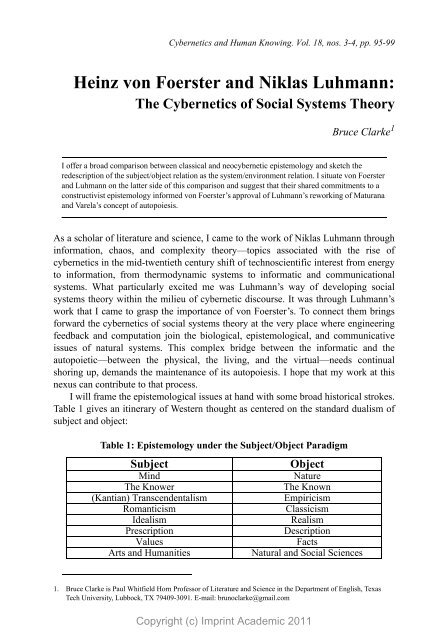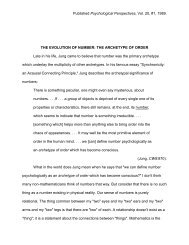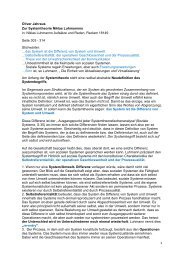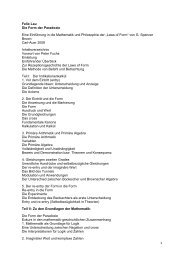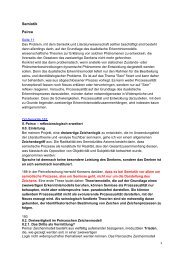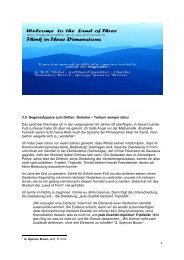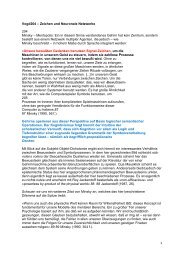Heinz von Foerster and Niklas Luhmann: The ... - IngentaConnect
Heinz von Foerster and Niklas Luhmann: The ... - IngentaConnect
Heinz von Foerster and Niklas Luhmann: The ... - IngentaConnect
Create successful ePaper yourself
Turn your PDF publications into a flip-book with our unique Google optimized e-Paper software.
Cybernetics <strong>and</strong> Human Knowing. Vol. 18, nos. 3-4, pp. 95-99<br />
<strong>Heinz</strong> <strong>von</strong> <strong>Foerster</strong> <strong>and</strong> <strong>Niklas</strong> <strong>Luhmann</strong>:<br />
<strong>The</strong> Cybernetics of Social Systems <strong>The</strong>ory<br />
Bruce Clarke 1<br />
I offer a broad comparison between classical <strong>and</strong> neocybernetic epistemology <strong>and</strong> sketch the<br />
redescription of the subject/object relation as the system/environment relation. I situate <strong>von</strong> <strong>Foerster</strong><br />
<strong>and</strong> <strong>Luhmann</strong> on the latter side of this comparison <strong>and</strong> suggest that their shared commitments to a<br />
constructivist epistemology informed <strong>von</strong> <strong>Foerster</strong>’s approval of <strong>Luhmann</strong>’s reworking of Maturana<br />
<strong>and</strong> Varela’s concept of autopoiesis.<br />
As a scholar of literature <strong>and</strong> science, I came to the work of <strong>Niklas</strong> <strong>Luhmann</strong> through<br />
information, chaos, <strong>and</strong> complexity theory—topics associated with the rise of<br />
cybernetics in the mid-twentieth century shift of technoscientific interest from energy<br />
to information, from thermodynamic systems to informatic <strong>and</strong> communicational<br />
systems. What particularly excited me was <strong>Luhmann</strong>’s way of developing social<br />
systems theory within the milieu of cybernetic discourse. It was through <strong>Luhmann</strong>’s<br />
work that I came to grasp the importance of <strong>von</strong> <strong>Foerster</strong>’s. To connect them brings<br />
forward the cybernetics of social systems theory at the very place where engineering<br />
feedback <strong>and</strong> computation join the biological, epistemological, <strong>and</strong> communicative<br />
issues of natural systems. This complex bridge between the informatic <strong>and</strong> the<br />
autopoietic—between the physical, the living, <strong>and</strong> the virtual—needs continual<br />
shoring up, dem<strong>and</strong>s the maintenance of its autopoiesis. I hope that my work at this<br />
nexus can contribute to that process.<br />
I will frame the epistemological issues at h<strong>and</strong> with some broad historical strokes.<br />
Table 1 gives an itinerary of Western thought as centered on the st<strong>and</strong>ard dualism of<br />
subject <strong>and</strong> object:<br />
Table 1: Epistemology under the Subject/Object Paradigm<br />
Subject<br />
Mind<br />
<strong>The</strong> Knower<br />
(Kantian) Transcendentalism<br />
Romanticism<br />
Idealism<br />
Prescription<br />
Values<br />
Arts <strong>and</strong> Humanities<br />
Object<br />
Nature<br />
<strong>The</strong> Known<br />
Empiricism<br />
Classicism<br />
Realism<br />
Description<br />
Facts<br />
Natural <strong>and</strong> Social Sciences<br />
1. Bruce Clarke is Paul Whitfield Horn Professor of Literature <strong>and</strong> Science in the Department of English, Texas<br />
Tech University, Lubbock, TX 79409-3091. E-mail: brunoclarke@gmail.com<br />
Copyright (c) Imprint Academic 2011
96 Bruce Clarke<br />
<strong>The</strong> first thing to note is the pervasive polarism—an oscillating polarity to be sure:<br />
the dualism endemic to Western thought. Depending on one’s particular philosophical<br />
commitments, the plus <strong>and</strong> the minus signs flip back <strong>and</strong> forth from one side of the<br />
dichotomy to the other. Within this scheme, an abstract concept of mind—<br />
conceptualized as a single or individual faculty of reason ultimately modeled on the<br />
omniscient mind of a transcendent god—st<strong>and</strong>s over <strong>and</strong> against the multiplicity of<br />
the world—typically considered as mindless, or in a related dialect, mechanical. <strong>The</strong><br />
knower is thought to be detached from the known; the knowing subject submits the<br />
object to a scrutiny presumed to be capable of yielding a universally valid account,<br />
one that leaves the singular yet universal knower out of account. In reaction against<br />
such positivistic assumptions <strong>and</strong> detached postures, in recent centuries philosophies<br />
of mind <strong>and</strong> so-called “romantic” movements arise to protest so-called “classical”<br />
philosophies of nature. But even when discourses of qualitative value are held to<br />
transcend the quantification of facts; or when a life force is set apart from the<br />
supposedly dead world of matter <strong>and</strong> energy; or when the arts <strong>and</strong> humanities<br />
increasingly precariously stake their institutional rationales on an adversarial relation<br />
to an increasingly dominant cultural hegemony of the natural <strong>and</strong> social sciences, <strong>and</strong><br />
laments arise over the intellectual schizophrenias induced by the two cultures, <strong>and</strong> so<br />
forth, <strong>and</strong> so on; even then, this basic framework is not radically challenged.<br />
What are some of the unstated assumptions informing this classical <strong>and</strong> romantic,<br />
subject <strong>and</strong> object scheme, <strong>and</strong> what is missing from it? Consider the bar the runs<br />
down the middle of the diagram. It implies that the stated polarities, the conceptual<br />
cuts that sort out these opposites, are clean <strong>and</strong> simple—that the critical cleaver has<br />
come down true upon the joints of the world <strong>and</strong> neatly articulated them. It also<br />
implies that the bar is itself an “objective” conception st<strong>and</strong>ing apart from the subject<br />
that posits it. But is this really the case? And concerning an element missing here, we<br />
can ask: where does sociality—the notion that knowledge is not in fact an individual<br />
but a collective enterprise necessarily based on the communication of <strong>and</strong> not simply<br />
the making of observations—enter into this picture? Doesn’t the bar between mind<br />
<strong>and</strong> nature, knower <strong>and</strong> known, erase the matter of social differentials in favor of<br />
singularities idealized as universalities? <strong>The</strong> particular nexus of cybernetic thought<br />
<strong>and</strong> systems theory initiated by <strong>von</strong> <strong>Foerster</strong> <strong>and</strong> developed further by <strong>Luhmann</strong><br />
provides an alternative <strong>and</strong>, so to speak, more wholesome vision of what knowledge is<br />
<strong>and</strong> how it comes about. It is an alternative that leaves intact the benefits of classical<br />
thought styles in those local orbits where they may continue to do good work, but that<br />
overcomes their blindness to their own blind spots set in place by their particular<br />
forms of distinction <strong>and</strong> their dubious presumptions of universality.<br />
Twenty years after the end of the Macy conferences, <strong>von</strong> <strong>Foerster</strong> was<br />
consolidating his turn toward second-order cybernetics. In a cluster of papers written<br />
by the mid-1970s, <strong>von</strong> <strong>Foerster</strong> catalyzed new thinking about the deeper cognitive<br />
implications of circular causality. <strong>The</strong> process of recursion unlocked a range of<br />
complex self-referential systems, as second-order cybernetics turned its thinking upon<br />
itself. In order to arrive at a general discourse of operational circularity, <strong>von</strong> <strong>Foerster</strong><br />
Copyright (c) Imprint Academic 2011
<strong>The</strong> Cybernetics of Social System <strong>The</strong>ory 97<br />
posited his cybernetics of cybernetics as a scientific subject taking itself as its own<br />
object. In contrast, the Western epistemological tradition sketched above is calculated<br />
precisely, through the linear parsing of subject <strong>and</strong> object <strong>and</strong> the insistence on the<br />
strict ontological difference between them, to eliminate self-referential circularities. In<br />
orthodox Western philosophy, one could say that self-reference as an engine of<br />
paradox is granted phenomenological but not properly logical status: it is admitted as<br />
a possibility, but only as a possibility of subjective aberration.<br />
Viewed in this wider context, <strong>Luhmann</strong>’s social systems theory extends directly<br />
from <strong>von</strong> <strong>Foerster</strong>’s contributions to the recuperation of self-reference by tracing the<br />
ways that, for most a century, hard scientific thought has been forced to acknowledge<br />
the paradoxes of observation. <strong>Luhmann</strong>’s (2002) “Cognitive Program of<br />
Constructivism” follows <strong>von</strong> <strong>Foerster</strong>’s lead in tracing the epistemological<br />
repercussions of introducing observational self-reference into the knowledge claims of<br />
the natural sciences: “Interest in epistemological questions,” this essay begins, “is not<br />
limited to philosophy today. Numerous empirical sciences have, in the normal course<br />
of their research, been forced to proceed from the immediate object of their research to<br />
questions involving cognition. Quantum physics is perhaps the best known example,<br />
but it is no exception” (<strong>Luhmann</strong>, p. 128). Von <strong>Foerster</strong> <strong>and</strong> <strong>Luhmann</strong> both push the<br />
point that, especially in the rigorous forms dem<strong>and</strong>ed by hard science, the production<br />
of knowledge on the basis of controlled observations can no longer be conceptualized<br />
as a simple or transparent matter. Controlled observations must impose a cognitive<br />
construction upon the nature observed, <strong>and</strong> this state of affairs cannot be eliminated, it<br />
can only be compensated for.<br />
One goal of second-order cybernetics, then, has been to lobby scientific<br />
constituencies for greater representation of neocybernetic thinking about systemic<br />
circularity. For instance, in a 1994 interview, <strong>von</strong> <strong>Foerster</strong> discussed the impasses<br />
reached in the mainstream research programs of Artificial Intelligence. By disowning<br />
their cybernetic origins <strong>and</strong> consigning feedback <strong>and</strong> circular mechanisms to a minor<br />
role, they had become “nothing but control theory applied to living organisms” (<strong>von</strong><br />
<strong>Foerster</strong>, 1994). He expressed a related impatience with the philosophical hangover,<br />
epitomized in modern times by the theory of types Russell <strong>and</strong> Whitehead introduced<br />
in Principia Mathematica, sweeping the logical circularities of self-reference <strong>and</strong><br />
paradox under the theoretical rug. Instead,<br />
Cybernetics considers systems with some kind of closure, systems that act on themselves—<br />
something which, from a logical point of view, always leads to paradoxes since you encounter the<br />
phenomena of self-reference. I thought that cybernetics was trying to bring into view a crucial point<br />
in logical theory—a point that is traditionally avoided by logic; one which Russell tried to eliminate<br />
by bringing in the theory of types. …<br />
.… Cybernetics, for me, is the point where you can overcome Russell’s theory of types by taking a<br />
proper approach to the notions of paradox, self-reference, etc., something that transfers the whole<br />
notion of ontology—how things are—to an ontogenesis—how things become. … It is the dynamics<br />
of cybernetics that overcomes the paradox. <strong>The</strong> paradox produces a “yes” when it says a “no,” <strong>and</strong><br />
then produces a “no” from a “yes.” It’s always a production. In cybernetics you learn that paradox is<br />
Copyright (c) Imprint Academic 2011
98 Bruce Clarke<br />
not bad for you, but it is good for you, if you take the dynamics of the paradox seriously. (<strong>von</strong><br />
<strong>Foerster</strong>, 1994)<br />
<strong>The</strong>re is perhaps no faster way to an encounter with the sort of paradox <strong>von</strong><br />
<strong>Foerster</strong> was talking about than by forcing the epistemological issue of second-order<br />
systems theory. <strong>Luhmann</strong> puts the paradox point blank in “<strong>The</strong> Cognitive Program of<br />
Constructivism”: “it is only non-knowing systems that can know; or, one can only see<br />
because one cannot see” (<strong>Luhmann</strong>, 2002, p. 132). Indeed, how can a discourse of<br />
knowledge founded on a concept of self-reference, which implies the operational<br />
closure of subjects of knowledge reconceptualized as observing systems cut out from<br />
their surrounding environments, result in anything but a short circuit or an infinite<br />
regress? Let us seek an answer to this issue by clarifying what is at stake in <strong>von</strong><br />
<strong>Foerster</strong>’s conceptual shift. Figure 1 offers a diagram that situates the second-order<br />
shift within the discourse of general systems theory:<br />
Figure 1: Epistemology Under the System/Environment Paradigm<br />
This cognitive regime bars any traditional form of empirical or realist<br />
representationalism, any simplistic notion of knowledge as a mechanics of linear<br />
inputs <strong>and</strong> outputs. Cognized as a system, subjectivity is rendered as a contingent<br />
operational effect rather than assumed as a free-floating or even disembodied agency:<br />
this is one of the things <strong>von</strong> <strong>Foerster</strong> means by stressing, “It’s always a production.”<br />
<strong>The</strong> boundary between subject <strong>and</strong> object is similarly retrieved from conceptual<br />
neutrality <strong>and</strong> re-cognized as both an ongoing product of <strong>and</strong> an impassable limit to<br />
the operation of the system. A system boundary never just is, ontologically, but is<br />
always coming into being as part <strong>and</strong> parcel of the system’s total ontogenesis, or as<br />
this will come to be called, autopoiesis. As a self-referential product of the system’s<br />
operational enclosure, the boundary guarantees that the system is autonomous, or<br />
information-tight. <strong>The</strong> environment as object cannot enter into the system in the mode<br />
Copyright (c) Imprint Academic 2011
<strong>The</strong> Cybernetics of Social System <strong>The</strong>ory 99<br />
of its own being, cannot dictate to the system. What it can do is perturb its observer in<br />
such a way that the system reorganizes its own elements to compensate, which<br />
compensation must then count for the system’s cognition of the object.<br />
When I interviewed <strong>von</strong> <strong>Foerster</strong>, I was particularly interested in asking him about<br />
<strong>Luhmann</strong>’s relation to the work of Maturana <strong>and</strong> Varela. This topic is also important<br />
for assessing the scientific elements of <strong>Luhmann</strong>’s work, because of the controversy<br />
<strong>Luhmann</strong> generated by displacing the theory of autopoiesis from the “harder” science<br />
of living systems to the “softer” science of social systems. Although this move had<br />
been tried before, no one prior to <strong>Luhmann</strong> had extended autopoiesis in such a<br />
complex <strong>and</strong> coherent way into the metabiotic nexus. Von <strong>Foerster</strong>, I think, may be<br />
said to have agreed, at least implicitly, at least with <strong>Luhmann</strong>’s opening move, that it<br />
is not improper to generalize the concept of biological autopoiesis to metabiotic<br />
systems as well:<br />
<strong>Luhmann</strong> himself corresponded a lot with me. He visited me; he was here himself, sitting on this<br />
chair; <strong>and</strong> he was very interested in me because he knew <strong>Heinz</strong> underst<strong>and</strong>s autopoiesis. And he<br />
wanted to articulate autopoiesis for social theory. And I always told him, “Be very careful, you will<br />
step on Maturana’s toes. <strong>The</strong> most sensitive things, maybe there are already some swellings on his<br />
toes.” But I know Maturana very well. In fact I was present when the two guys, Varela <strong>and</strong><br />
Maturana, invented the notion of autopoiesis <strong>and</strong> wrote their first paper … <strong>The</strong>ir problem with<br />
<strong>Luhmann</strong> is they do not want to have autopoiesis applied to social theory. This is just a personal<br />
idiosyncrasy. Because they would like to keep autopoiesis solely for biological discussion or<br />
biological research. (Clarke, 2009, pp. 28-29)<br />
On the basis of this testimony we could speculate that <strong>Luhmann</strong> corresponded<br />
with <strong>von</strong> <strong>Foerster</strong> so assiduously, <strong>and</strong> referenced him so consistently in his published<br />
work, not only because of the broad congruence of their conceptual orientations, but<br />
also because <strong>von</strong> <strong>Foerster</strong> provided <strong>Luhmann</strong> with an important sign of validation for<br />
his critical theoretical leap from biological to social <strong>and</strong> psychic autopoiesis.<br />
References<br />
Clarke, B. (2009). Interview with <strong>Heinz</strong> <strong>von</strong> <strong>Foerster</strong>. In B. Clarke & M. B. N. Hansen (Eds.), Emergence <strong>and</strong><br />
embodiment: New essays in second-order systems theory (pp.26-33). Durham, NC: Duke University Press.<br />
<strong>Luhmann</strong>, N. (2002). <strong>The</strong> cognitive program of constructivism <strong>and</strong> a reality that remains unknown. In W. Rasch (Ed.),<br />
<strong>The</strong>ories of distinction: Redescribing the descriptions of modernity (pp. 128–52). Stanford, CA: Stanford<br />
University Press.<br />
<strong>von</strong> <strong>Foerster</strong>, H. (1994). Interview, with Stefano Franchi, Güven Güzeldere, <strong>and</strong> Eric Minch. Stanford Electronic<br />
Humanities Review, 4 (2). Retrieved September 14, 2011 from http://www.stanford.edu/group/SHR/4-2/text/<br />
interview<strong>von</strong>f.html.<br />
<strong>von</strong> <strong>Foerster</strong>, M. (2011). Frog Cabinet (details). Oil <strong>and</strong> egg tempera on panel; 18 x 24 in.<br />
Copyright (c) Imprint Academic 2011


